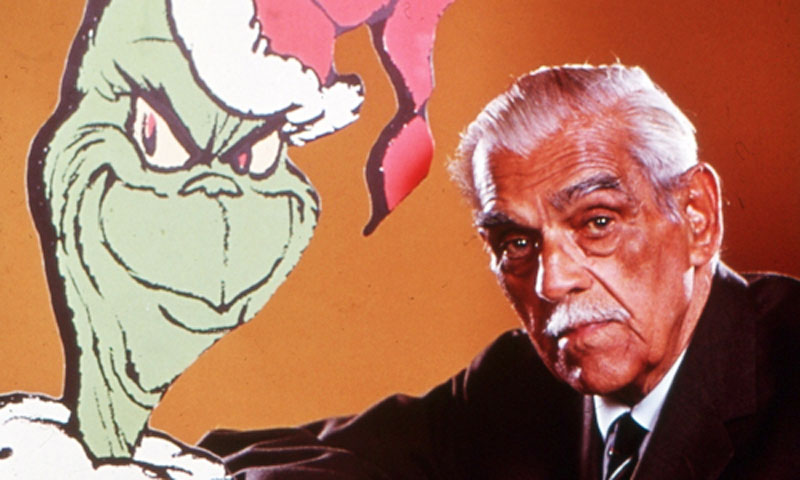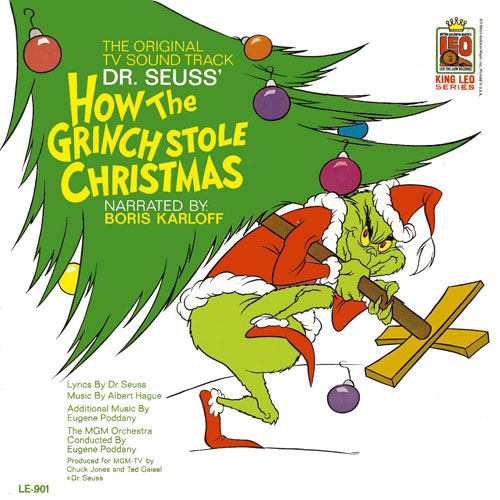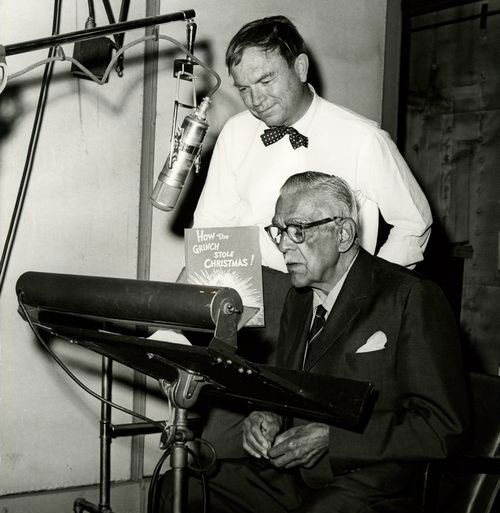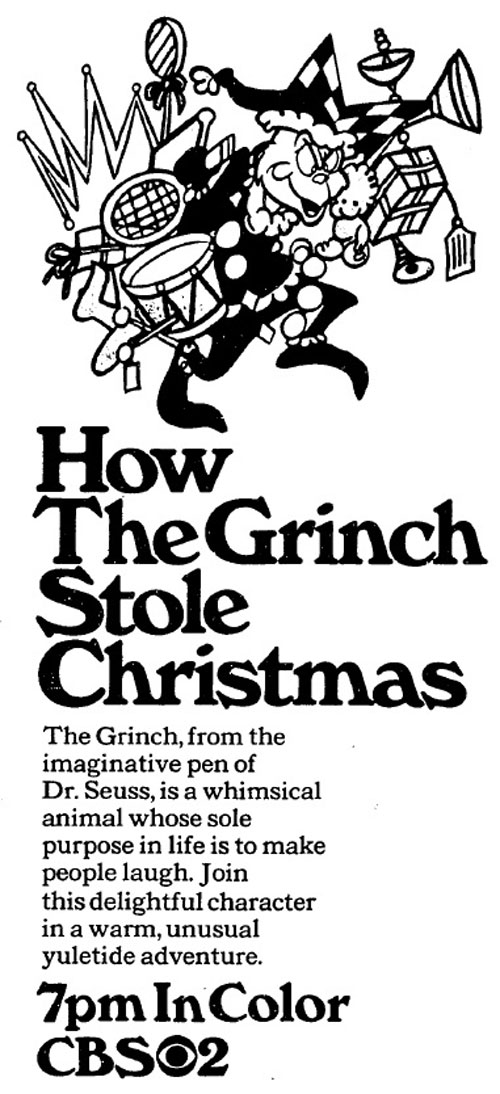STEPHEN JACOBS goes behind the scenes to celebrate this weekend’s 50th anniversary of 1966’s How the Grinch Stole Christmas TV special, narrated by British horror star Boris Karloff

If you were to mention the word ‘Grinch’ I expect most people would picture Jim Carrey in a green furry suit doing a version of his schtick from The Mask (1994). Carrey’s Grinch, the titular character in director Ron Howard’s (Backdraft, Apollo 13 etc) biggest grossing picture to date, was, however, neither the first, nor the best, version of Dr. Seuss’ 1956 poem. That honour goes to the 1966 animated version by the creator of the cartoon characters of the Road Runner, Wile. E. Coyote and Pepe LePew – the legendary Chuck Jones.
In 1963 Jones and his team were hired by MGM to create a new series of Tom and Jerry cartoons and it was here he had the notion of working with Theodor Giesel (a.k.a. Dr. Seuss).
The two men had known each other during the war when they had collaborated on Private Snafu, the Army’s instructional cartoon shorts that followed the misadventures of the incompetent soldier of the title. Since then Giesel had become well known for his children’s books such as The Cat in the Hat (1957) and Green Eggs and Ham (1960) — the ideal fodder, Jones thought, for an animated short.
“I really wanted to do something of his [Seuss],” Jones later explained. “So I went to MGM and told them I thought it was time we did something in that field and I thought that Dr. Seuss was the right person to go to. So I called up Ted and I asked would he be willing to think about doing it—he was anti-Hollywood because, after the war, they pirated a lot of his stuff and took his credits off some documentaries, one of which won an Academy Award and somebody else took it. He was pretty sour on that but I told him this was television…
“We talked about it and decided on How The Grinch Stole Christmas! Then I had to talk MGM into the idea of spending money for a storyboard. I did most of the drawings—about 1700 — I had a few people who gave me very good help too… In those days though, it isn’t like it is today—you had to sell it to a sponsor and then you’d go to the network and say, ‘Well, here’s the product. This guy’s willing to pay for it’.”
Jones, therefore, went out and gave 25 showings of the storyboard to the breakfast food and chocolate companies who all refused it. In the end the project was picked up by a rather unlikely sponsor—the Foundation for Commercial Banks.

Dr. Seuss’s poem concerned the Grinch, a mean, spiteful creature who is afflicted by ‘a heart two sizes too small’. Living atop Mount Crumpit, north of Whoville, the Grinch watches with irritation as the Who’s merrily prepare to celebrate the festive season. So, on the night of Christmas Eve, in an attempt to halt the festivities, the Grinch steals all the presents and decorations from the inhabitants of Whoville.
“The next day, however, and despite their losses, the Who’s Christmas spirit remains and as they sing, hand in hand, the Grinch’s heart miraculously grows three sizes. “How The Grinch Stole Christmas is about a stinker who reforms,” explained Dr. Seuss. “It pokes fun at the commercialisation of Christmas, but I don’t set out with a cudgel to attack anyone.”
When it came to choosing a narrator for the cartoon Jones recalled a spoken word album he had heard and enjoyed. It was one of the Caedmon releases of Kipling’s Just So Stories read by Boris Karloff. It was an inspired choice. “To me,” Jones later said, “one of the most important things was my getting Boris Karloff… He had this lovely, wonderful voice. Everybody thought of him as a villain. And he was so dear when he read it, you know. He really gave accent to each one and each note, and the narrator was important there.”
Boris Karloff narrates How the Grinch Stole Christmas
Karloff had always been a children’s favourite. In the 1930s his role of the Frankenstein monster elicited letters of sympathy from children who sympathised with the creature. Karloff explained, “Over the years thousands of children wrote, expressing compassion for the great, weird creature who was so abused by its sadistic keeper that it could only respond to violence with violence. Those children saw beyond the make-up and really understood.” In 1950 Karloff had starred on Broadway as Captain Hook in Peter Pan and six years later started an association with Caedmon Records. Over the next decade he recorded a series of spoken word LPs, reading tales by such authors as Hans Christian Andersen, The Brothers Grimm, and Lewis Carroll.
The Dr. Seuss cartoon reportedly took 10 months to complete and cost CBS $315,000. Normally, Jones explained, animators would make three drawings per foot for a children’s TV film. Jones and his team were doing 15 drawings per foot for The Grinch. “You have to do this for believability,” he said. “I have done 90 percent of the sketches myself. It’s the only way to evolve things.”
In all, the piece required over 25,000 drawings and more than 200 backgrounds. “You have to work on the detail for a show like this to be believable,” Jones explained. “Children are remarkable critics—if the drawings were not fully animated, they would be terribly disappointed. Dr. Seuss was so pleased with the result he has agreed, eagerly, to get started on the animation to another book, the popular Horton Hears a Who.” According to one newspaper report CBS executives had claimed the total cost of the project was $600,000 making it, as Chuck Jones announced at the time, probably, “the most expensive half hour ever put on television”.

Broadcast on Sunday, 18 December 1966 the half-hour cartoon garnered mixed reviews. Jack Gould of the New York Times wrote, “It just may be that the Grinch is a creation that should be left undisturbed on the printed page, where the graceful simplicity of the language of Dr. Seuss weaves its own wonder and where the reader’s imagination can make its own contribution. At all events, this literal representation of the Grinch in animated form fell a trifle short of expectation.
In the preoccupation with the hurried narration, the spell was not quite there, perhaps because there was inadequate time to savour the delights of Whoville as a counterpoint to the grumpiness of the Grinch. The animation by Mr. Jones was very good and Boris Karloff was both the voice of the Grinch and the narrator. One irony in the presentation was not to be overlooked. The testimony that Christmas is an occasion when mundane concerns really are secondary to joys of the spirit was not exactly reinforced by the many commercials on behalf of all-service banks.”
The Los Angeles Times reviewer, Hal Humphrey, agreed. “As unfashionable as it is to be an old grouch so close to Christmas,” he wrote, “I’ll have to risk it and say that the Dr. Seuss debut on CBS-TV Sunday night with his cartoon story of How The Grinch Stole Christmas was a disappointment. It is my opinion that the book was better than this expensive half-hour colour TV adaptation proved to be. Perhaps I was expecting too much, knowing that 10 months of labour and $315,000 went into it… the result was much too mild, and I suspect the usually action-hungry small viewers may have shared my feeling.”

The cartoon did have its supporters, though. One was Clay Gowran of the Chicago Tribune. “Telecast last evening [over channel 2 locally], the special must have had the moppet brigade hanging on every minute. The cartooning, as might be expected with Jones at the helm, was excellent, a lively merger of Walt Disney and Rube Goldberg. Colour quality was superb. And old meany Karloff was just right as the off-camera voice for the tale about mean old Grinch, who first hated and then learned to love Yuletime.”
Despite the mixed reviews, however, Chuck Jones retained his faith in the project and correctly predicted it would soon become established as a seasonal favourite. The reason for its success, he felt, was clear, as he later explained in a letter to Evelyn Karloff. “It now seems apparent that How The Grinch Stole Christmas will be a Christmas feature on television for as long as anyone can envisage,” he wrote.
“In my opinion the major reason for this is that Mr. Karloff gave such a thoughtful and understanding reading of the script. I think it is entirely appropriate that children for many generations will find joy and a deeper understanding of Christmas through the skill of your husband.” Dr. Seuss, too, was grateful for Karloff’s contribution. “Working with him on How The Grinch Stole Christmas was a privilege, an honour and will be and to me always,” he wrote.
Fifty years after Jones’ cartoon first aired a new CGI adaptation is in development. It has been reported that Benedict Cumberbatch will provide the voice of the Grinch in this new picture. While Jim Carey did an admirable job in 2000 and I’m sure Cumberbatch will do the role justice in the new version for me, at least, there is only one true Grinch, one perfect actor with just the right voice for the role – Boris Karloff.
Watch clip from How the Grinch Stole Christmas
What do you think of Boris Karloff’s performance in How the Grinch Stole Christmas? Tell us in the comments section below!








There are some things that were done with such perfection in their original form, that subsequent attempts, no matter how well done, just seem off. Judy Garland as Dorothy, Gene Wilder as Willy Wonka, Bob Denver as Gilligan, and Boris Karloff as The Grinch. These people BECAME their character, and any who follow are just imitations at best.
Oh , I soo agree , Boris was perfect for the Grinch voice ! I first watched it when I was a child in the 1960s , I cried at the end ,not cos I was sad ,cos I was so moved by the story but more so the way dear Boris narrated it & played the Grinch voice , also the Happy ending ! 🥲
What a strange question! Can you think of anyone else whose voice could match Karloff’s? For those listeners – like myself – old enough to have seen Karloff in his many monster movies, it came as a surprise when I first heard The Grinch….My reaction was Why Karloff? I suspected my memory of all those monster movies would render Karloff’s performance in The Grinch weak….But Karloff’s voice performance was perfect…It is partly the English accent, but more the timing, the gentleness and the combination of narration and voice acting, that made this a classic…Even the face of the Grinch somehow reminded me of Karloff. But kids who have no knowledge of Karloff the monster actor, love the voice and have come to associate it with the story…..you can’t separate the two anymore. I once read The Grinch to a group of children and I was stopped cold in my tracks….”No”, one boy complained, “that’s not the right story”…..I knew then that Karloff had achieved immortal status as part of a classic!